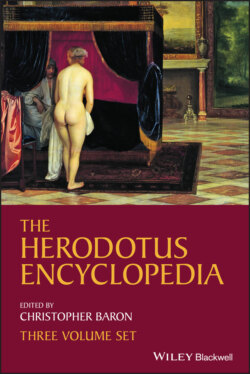Читать книгу The Herodotus Encyclopedia - Группа авторов - Страница 541
REFERENCES
Оглавление1 Boedeker, Deborah. 1988. “Protesilaos and the End of Herodotus’ Histories.” ClAnt 7: 30–48. Reprinted in ORCS Vol. 1, 359–78 (slightly revised).
2 Dewald, Carolyn. 1997. “Wanton Kings, Pickled Heroes, and Gnomic Founding Fathers: Strategies of Meaning at the End of Herodotus’s Histories.” In Classical Closure: Reading the End in Greek and Latin Literature, edited by Deborah H. Roberts, Francis M. Dunn, and Don Fowler, 62–82. Princeton: Princeton University Press. Reprinted in ORCS Vol. 1, 379–401.
3 Fisher, Nick. 2002. “Popular Morality in Herodotus.” In Brill’s Companion to Herodotus, edited by Egbert J. Bakker, Irene J. F. de Jong, and Hans van Wees, 199–224. Leiden: Brill.
4 Flower, Michael A., and John Marincola, eds. 2002. Herodotus: Histories Book IX. Cambridge: Cambridge University Press.
5 Fornara, Charles W. 1971. Herodotus: An Interpretative Essay. Oxford: Clarendon Press.
6 Harrison, Thomas. 2015. “Herodotus on the Character of Persian Imperialism (7.5–11).” In Assessing Biblical and Classical Sources for the Reconstruction of Persian Influence, History and Culture, edited by Thomas Harrison and Anne Fitzpatrick‐McKinley, 9–48. Wiesbaden: Harrassowitz.
7 Immerwahr, Henry R. 1966. Form and Thought in Herodotus. Cleveland: Western Reserve University Press.
8 Moles, John L. 1996. “Herodotus Warns the Athenians.” Papers of the Leeds International Latin Seminar 9: 259–84.
9 Raaflaub, Kurt A. 1987. “Herodotus, Political Thought, and the Meaning of History.” Arethusa 20: 221–48.
